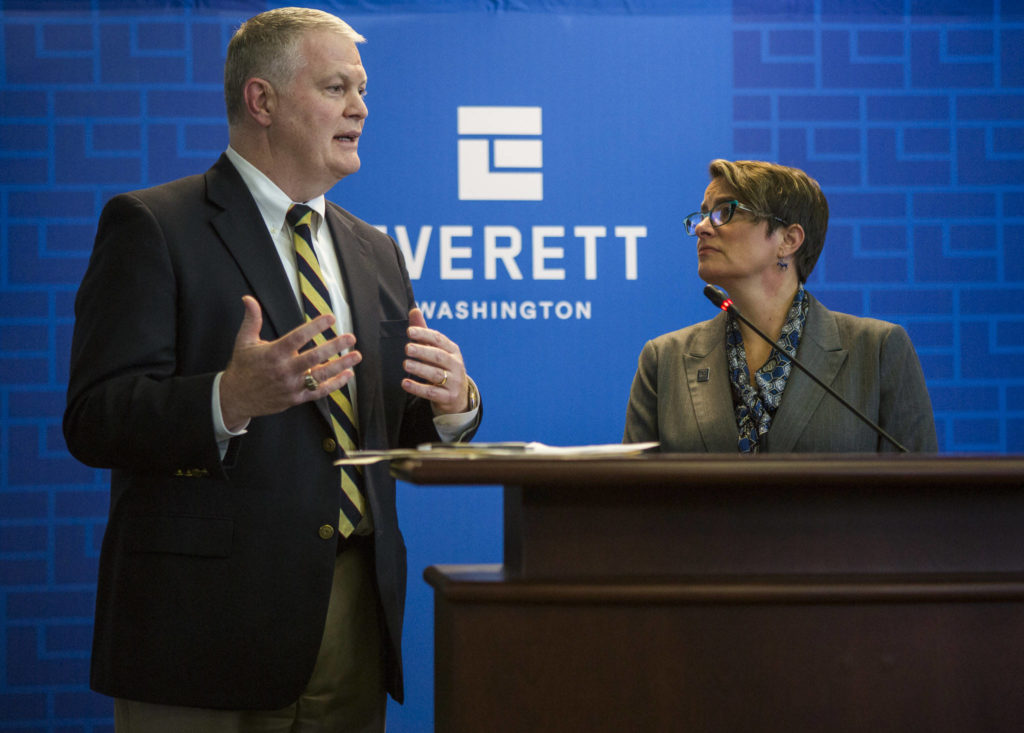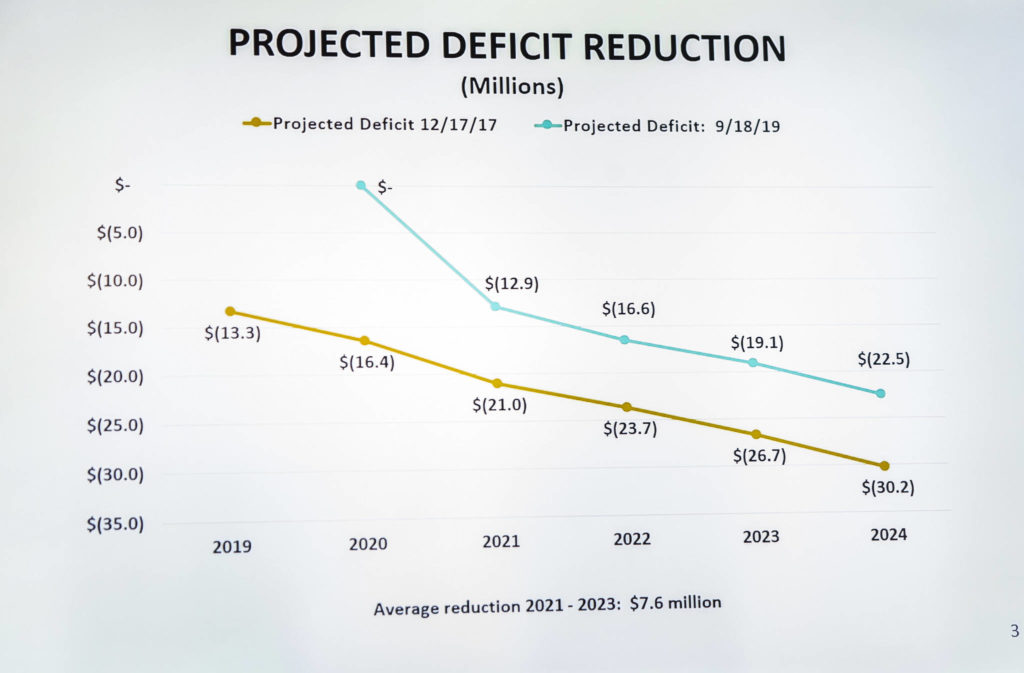EVERETT — With a $13 million budget deficit to rein in next year, residents will face a reduction in services without new revenue, Mayor Cassie Franklin warned during her 2020 budget address.
Franklin and Council member Scott Murphy, who heads the council’s Budget and Finance Subcommittee, presented the proposed 2020 budget Wednesday morning in council chambers to a crowd of mostly city employees.
To balance next year’s budget, Franklin said all city departments “tightened their belts” and staff positions were cut.
“These short-term cuts are not the long-term answer,” Franklin said.
Unspent money from this year, also known as the carry forward, would cover nearly 75% of the spending gap for 2020. No new fees or taxes are proposed in this budget.
The city’s general government operating budget would grow about 7.4% from the current budget, from $138.4 million to $148.7 million.
The mayor had expressed concern about a projected deficit as high as $20 million during a debate earlier this month over Initiative 976. If the initiative passes, the measure will significantly reduce car tab fee revenue the city uses to pay for paving projects and Everett Transit, a move Franklin said would have devastating consequences.
Franklin inherited the budget deficit when she took office in 2018. It was forecast to grow to $30 million by 2024. Last year, the council made $5.6 million in long-term cuts, which included eliminating positions and increasing some fees.
“There’s wasn’t any low-hanging fruit when I got here, it was taken care of during the recession,” Franklin said in an interview before the budget announcement.
This year Franklin trimmed another $1.7 million from the deficit.
Another five positions were eliminated, partly through a voluntary separation program and attrition, according to Franklin. No employees were laid off this year.
No cuts were made to staff in the police or fire departments. A three-year $1.6 million federal grant is enabling the city to add 10 firefighters to Station 6 in south Everett.
Franklin highlighted crime data that showed violent crime decreased by 25% between 2017 and 2018. And property crime went down by 8% during the same time period.
“These investments we are making are paying off,” Franklin said.
In 2020, the mayor said she will release a plan to increase the police force back to pre-recession levels — a minimum of two officers per 1,000 city residents.
Franklin also set aside another $300,000 for police body cameras. That’s in addition to the $100,000 in the 2019 budget. A pilot program is set to start with one police unit and grow from there.
All staff will get a cost-of-living increase, except those who work in the mayor’s office who voluntarily elected not to take it. Franklin, whose salary is decided by a city commission and is currently paid $189,000 a year, is donating her cost-of-living increase back to the city.
A change to city staff’s health plans is saving $350,000 in the first year. That reduction is projected to increase to $1 million in 2023, Franklin said. This year, the city partnered with Vera Whole Health to open a city-sponsored primary and prevention care clinic while also moving to high deductible plans.
Back in the budget this year is full funding for street maintenance and contributions to police and fire pensions. Those cuts last year were intended to be temporary.
The proposed budget doesn’t contain a back-up plan if voters approve I-976. If that happens, large cuts to the street maintenance fund and Everett Transit will occur, forcing the city to make significant budget adjustments, Franklin said.
The Animal Farm, the seasonal petting zoo at Forest Park, once again escaped elimination. It was on the chopping block last year, but funding was added in the hopes another organization might take it over. There were no takers, according to the city.
Big decisions are coming in 2020.
“There is nothing left to cut that is not painful,” Franklin said. “It’s not all doom and gloom, but it’s a lot of doom and gloom.”
A report released in 2018, found the city provided more services than comparable jurisdictions. Of the identified peer cities, many stopped directly providing fire, library, parks, transit and water services.
It will be up to the council to make the decision — deep service cuts or increase revenue somehow, Franklin said.
Everett is not alone in its budget woes. Across the region cities struggle to keep pace as expenses grow faster than revenues. Franklin and Murphy place blame on a state law that restricts annual property tax increases to 1%, which the mayor has recommended taking again this year.
“The structural deficit won’t go away, it’s something that’s here to stay as long as we have a 1% cap on property tax increases … and if city expenses in general run at 3 plus, 4 plus (%) a year,” Murphy said Wednesday.
Options could include merging some services with existing regional systems, such as fire, parks, library or transit, or putting levies on the ballot to raise taxes.
“Do the citizens want to increase their taxes in order to continue to provide certain services?” Murphy said. “Or are they willing to leave their taxes the same and potentially suffer some sort of a reduction of services?”
Two more public hearings are scheduled on the proposed budget, Nov. 6 and 13, before the council votes.
Lizz Giordano: 425-374-4165; egiordano@heraldnet.com; Twitter: @lizzgior.
Talk to us
> Give us your news tips.
> Send us a letter to the editor.
> More Herald contact information.




























